TODAY’S READING FROM THE OLD TESTAMENT- NAHUM 1:1- 3:19
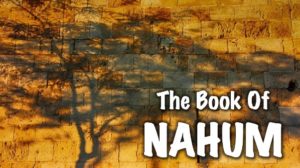 The Book of Nahum is a sequel to the Book of Jonah. When Jonah walked the streets and preached to his enemies at Nineveh, the people repented and were spared of God’s judgment. But now, approximately one hundred years later, we discover that the Ninevites had returned to wickedness. The capital city of the Assyrian Empire had returned to its wicked ways. The prophet Nahum was God’s prophet, appointed to pronounce judgment upon Assyria and prophesy its end.
The Book of Nahum is a sequel to the Book of Jonah. When Jonah walked the streets and preached to his enemies at Nineveh, the people repented and were spared of God’s judgment. But now, approximately one hundred years later, we discover that the Ninevites had returned to wickedness. The capital city of the Assyrian Empire had returned to its wicked ways. The prophet Nahum was God’s prophet, appointed to pronounce judgment upon Assyria and prophesy its end.
The whole book is considered ‘war poetry’, an extended assault of judgments. There are no oracles of redemption or blessing for the Assyrians here.
How the nations of the Middle East and Western Asia must have rejoiced to know that the heavy hand of Assyrian dominance was going to be lifted!
Assyria had been the power that intimidated, tyrannized, and oppressed the Fertile Crescent of the Middle East for many generations (two centuries).
Note the long line of Assyrian invasions:
- Shalmaneser II (859-824 B.C.) defeated Ben-Hadad (I Kings 20:34; 22:1-3) and forced Jehu to pay tribute (1 Kings 19:15-17; 2 Kings 8:7-15; 9:1-6).
- Tiglath-pileser III (745 – 727 B.C.) forced Menahem to pay tribute and was bribed by Ahaz for help (2 Kings 15:19, 28-29; 16:10-16; 1 Chronicles 5:6, 26; 2 Chronicles 28:19-21; Isaiah 7:1-9:1).
- Shalmaneser V (727-722 B.C.) invaded Israel and besieged Samaria (2 Kings 17:1-3).
- Sargon II (722 – 705 B.C.) captured Samaria and put an end to the northern kingdom of Israel (2 Kings 17:6; Isaiah 20:1-6) and then conquered Egypt in the battle of Raphia.
- Sennachereb (705-681 B.C.) invaded and took much of Judah until God intervened, and he was overthrown before the gates of Jerusalem (2 Kings 18:13-19:36).
- Essar-haddon (681-669 B.C.) attacked Jerusalem and took King Manasseh captive (releasing him a year later), and colonized Samaria (2 Kings 19:37; 21:13-14; 2 Chronicles 33:11; Ezra 4:2-9).
- Ashurbanipal (669-633 B.C.) was the absolute monarch of Assyria and virtual ruler of Babylon for more than forty years, forcing Manasseh to pay tribute. In 664 B.C., he destroyed the Egyptian city of Thebes, also known as No Amon (2 Kings 21:2; 2 Chronicles 33:11; Ezra 4:2-9).
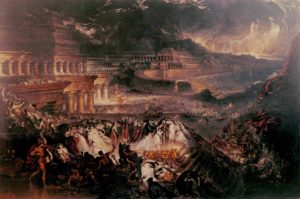 The Assyrian King, Ashurbanipal, was exceptionally cruel. There are many horror stories of the atrocities he committed. (Nahum says: ‘Woe to the city of blood, full of lies, full of plunder, never without victims’, Nahum 3:1). Ashurbanipal tore lips and limbs from the kings he conquered. He captured three Elamite kings, harnessed them like horses to his chariot, and drove them through the streets. He hung the decapitated head of a king around the neck of his prince. He forced one Chaldean king to commit suicide, decapitated him, and hung his head from a tree in his garden, then feasted with the queen beneath it.
The Assyrian King, Ashurbanipal, was exceptionally cruel. There are many horror stories of the atrocities he committed. (Nahum says: ‘Woe to the city of blood, full of lies, full of plunder, never without victims’, Nahum 3:1). Ashurbanipal tore lips and limbs from the kings he conquered. He captured three Elamite kings, harnessed them like horses to his chariot, and drove them through the streets. He hung the decapitated head of a king around the neck of his prince. He forced one Chaldean king to commit suicide, decapitated him, and hung his head from a tree in his garden, then feasted with the queen beneath it.
Under Ashurbanipal’s rule, Assyria rose to the zenith of its power. It appeared to be an unconquerable kingdom. At this time, God called Nahum to prophesy Nineveh’s downfall.
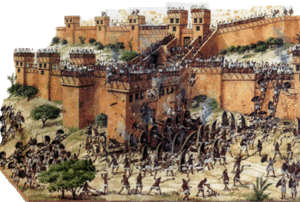 Nahum’s name means ‘Comforter’. Whereas Jonah preached revival to Nineveh, Nahum prophesied its ruin.
Nahum’s name means ‘Comforter’. Whereas Jonah preached revival to Nineveh, Nahum prophesied its ruin.
Nahum proclaims the facts concerning the God who revealed Himself to the Israelites at Sinai.
He repeats God’s self-introduction given to Moses in Exodus 34:6-7:
Nahum 1:3 3 The LORD is slow to anger and great in power, and the LORD will by no means leave the guilty unpunished. In whirlwind and storm is His way, and clouds are the dust beneath His feet.
 Nahum declares that the Lord is both loving and just. Therefore, He must bring judgment upon the unrepentant.
Nahum declares that the Lord is both loving and just. Therefore, He must bring judgment upon the unrepentant.
Nahum 1:7-8 7 The LORD is good, a stronghold in the day of trouble, and He knows those who take refuge in Him. 8 But with an overflowing flood He will make a complete end of its site, and will pursue His enemies into darkness.
Whereas judgment is pronounced on Nineveh and her idols, the promise of a blessed future is renewed for Judah:
 Nahum 1:15 15 Behold, on the mountains the feet of him who brings good news, who announces peace! Celebrate your feasts, O Judah; Pay your vows. For never again will the wicked one pass through you; He is cut off completely.
Nahum 1:15 15 Behold, on the mountains the feet of him who brings good news, who announces peace! Celebrate your feasts, O Judah; Pay your vows. For never again will the wicked one pass through you; He is cut off completely.
With supernatural intelligence, Nahum prophetically describes the uniforms and shields of the Babylonians before they approach (Nahum 2:3).
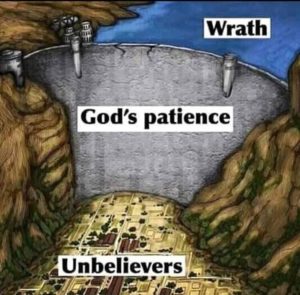 He sees the river gates being thrown open and causing the palace to collapse (Nahum 2:6). This may refer to the enemy coming into Nineveh like a flood or to the actual flooding of the city by the opening of river gates that dammed the Tigris that archaeologists have discovered. When an enormous amount of water accumulated, the gates would open and allow water to flood Nineveh.
He sees the river gates being thrown open and causing the palace to collapse (Nahum 2:6). This may refer to the enemy coming into Nineveh like a flood or to the actual flooding of the city by the opening of river gates that dammed the Tigris that archaeologists have discovered. When an enormous amount of water accumulated, the gates would open and allow water to flood Nineveh.
The city will be plundered and stripped. The punishment that is inflicted upon Nineveh will reflect the cruelties she brought to other cities in other countries, including Thebes in Egypt (3:8-11).
 The vindication of the cause of the oppressed is clear as judgment falls on Nineveh:
The vindication of the cause of the oppressed is clear as judgment falls on Nineveh:
Nahum 3:19 19 There is no relief for your breakdown, your wound is incurable. All who hear about you will clap their hands over you, for on whom has not your evil passed continually?
The Book of Nahum reminds us of God’s justice. He does not ignore sin. It must be punished. The Assyrians were given over to the idolatrous worship of Ishtar, the goddess of sexual passion, fertility, and war. They slaughtered people indiscriminately. God opposes the shedding of innocent blood. He opposes the proud and self-confident who arrogantly reject His rule of righteousness.
TODAY’S READING FROM THE NEW TESTAMENT – REVELATION 8:1-13
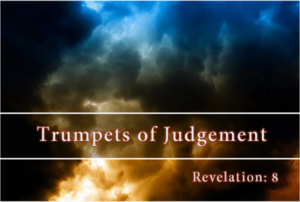 There is silence in heaven at the opening of the seventh seal for about a half-hour. Heaven holds its breath as the seventh seal unleashes the seven trumpets that announce the solemn events that herald and trigger the return of the King.
There is silence in heaven at the opening of the seventh seal for about a half-hour. Heaven holds its breath as the seventh seal unleashes the seven trumpets that announce the solemn events that herald and trigger the return of the King.
The seven trumpets are released from the seventh seal and given to seven angels (Revelation 8:2).
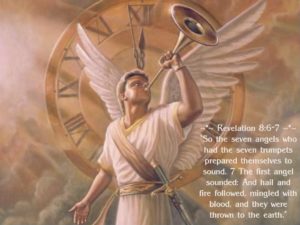 Another pause takes place in heaven as incense is added to the golden censer of an angel carrying the prayers of the saints. Then the angel takes the censer and fills it with fire from the altar. The altar speaks of God’s self-revelation in the cross of Christ. There, justice is satisfied, righteousness is vindicated, and the wrath of God is poured out upon the perfect sin offering, where it is borne in the body of Jesus, the propitiating substitute for those who believe. But the wrathful judgment for those who reject the cross must be borne on their own bodies. And so, the fire of the altar is mixed with the cumulative prayers of the saints throughout the centuries who have prayed, “Thy kingdom come, thy will be done.”
Another pause takes place in heaven as incense is added to the golden censer of an angel carrying the prayers of the saints. Then the angel takes the censer and fills it with fire from the altar. The altar speaks of God’s self-revelation in the cross of Christ. There, justice is satisfied, righteousness is vindicated, and the wrath of God is poured out upon the perfect sin offering, where it is borne in the body of Jesus, the propitiating substitute for those who believe. But the wrathful judgment for those who reject the cross must be borne on their own bodies. And so, the fire of the altar is mixed with the cumulative prayers of the saints throughout the centuries who have prayed, “Thy kingdom come, thy will be done.”
Is this a surprising answer to prayer? The holiness of God demands it. The fire and incense are thrown to the unrepentant who dwell upon the earth. There are peals of thunder, the flashes of lightning strikes, and an earthquake (Revelation 8:7).
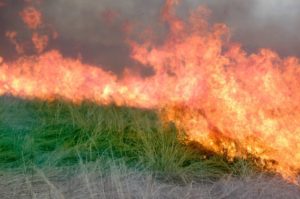 As with the first four seals, the first four trumpets are sounded in quick succession. With the sounding of the first trumpet come hail and fire mixed with blood. One-third of the earth is burned up, with the trees and the grass. (The third may mean that it is a fraction of the full judgment due, leaving still some opportunity for repentance.)
As with the first four seals, the first four trumpets are sounded in quick succession. With the sounding of the first trumpet come hail and fire mixed with blood. One-third of the earth is burned up, with the trees and the grass. (The third may mean that it is a fraction of the full judgment due, leaving still some opportunity for repentance.)
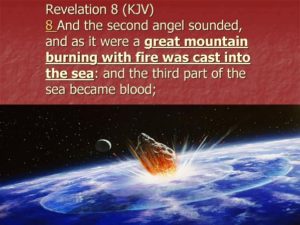 The second trumpet brings what appears to be a mountain of fire thrown into the sea, polluting one-third (a fraction) of the oceans, which turn blood red. One-third of the sea creatures die, and one-third of ocean-going vessels are destroyed.
The second trumpet brings what appears to be a mountain of fire thrown into the sea, polluting one-third (a fraction) of the oceans, which turn blood red. One-third of the sea creatures die, and one-third of ocean-going vessels are destroyed.
The third trumpet sounds, and a star from the heavens falls to earth, named Wormwood, and pollutes one-third of the freshwater system. The Lord will not heal these bitter poisoned waters as He did by the hand of Moses for His covenant people at Marah when he put in the tree of wood (a symbol of the cross) in Exodus 15:25. There is no Elijah to add a cruse of salt to the waters to heal them (2 Kings 2:21).
The people in Revelation 8 are those who ‘dwell upon the earth’ (Rev. 8:13). They have no place in their hearts for heaven or heaven’s offer. They see no personal need for Christ’s work on the cross.
The fourth trumpet sounds and a third of the light from the sun, the moon, and the stars is impacted. Darkness comes upon a portion (one third) of the earth, and a portion (one third) of the day is affected.
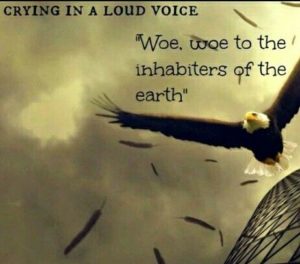 John then looks and sees what appears to be an eagle that speaks. It warns that three more trumpets remain to be sounded. Three woes indicate three curses, three judgments, are imminent.
John then looks and sees what appears to be an eagle that speaks. It warns that three more trumpets remain to be sounded. Three woes indicate three curses, three judgments, are imminent.
TODAY’S READING FROM THE BOOK OF PSALMS – PSALMS 136:1-26
 We come again to the Great Hallel, the Antiphonal Psalm where the people respond to pronounced truths echoing the chorus: “Give thanks to God of gods, for His mercy (hesed- covenant love) is everlasting”.
We come again to the Great Hallel, the Antiphonal Psalm where the people respond to pronounced truths echoing the chorus: “Give thanks to God of gods, for His mercy (hesed- covenant love) is everlasting”.
The Psalmist lists many of the wonderful things that God has done, starting with creation (v 4-9).
He praises God for His mighty deeds of deliverance. He lists great things that God did in the Exodus (v.10-15) and in the wilderness (v.16-26).
Give thanks to the God of heaven
For His love is everlasting! (Psalm 136:26)
TODAY’S READING FROM THE BOOK OF PROVERBS – PROVERBS 30:7-9
Proverbs 30:7-9 7 Two things I asked of You, Do not refuse me before I die: 8 Keep deception and lies far from me, Give me neither poverty nor riches; Feed me with the food that is my portion, 9 That I not be full and deny You and say, “Who is the LORD?” Or that I not be in want and steal, and profane the name of my God.
Can you pray this prayer? Do we hate lies and deception enough to want to be kept away from them? Are we content with a simple life of dependence upon the Lord, with neither poverty nor riches? Are we satisfied with our God-given portions?
Can we say with the Apostle Paul- “I have learned to be content in whatever circumstances I am?” (Philippians 4:11)
The Psalmist is aware of the danger of being deceived by success and material prosperity into a state of self-sufficiency and self-deception. He is aware of the temptation to illegal gain if in a state of poverty. He wants to live being true to the Lord’s righteousness, and dependent upon His grace.
PRAY FOR THE NATIONS – VENEZUELA
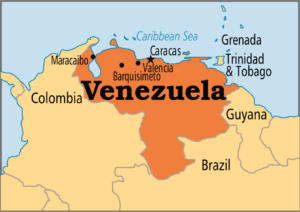 (from Prayercast.com and “Operation World Prayer Guide”)
(from Prayercast.com and “Operation World Prayer Guide”)
- Pray for Christ to reveal himself to those blinded by spiritism, Islam, and other false religions.
- Pray for all 30 Amerindian tribes to be transformed by the Word of God despite government opposition.
- Pray for solutions to economic instability and high crime rates.
SUMMARY
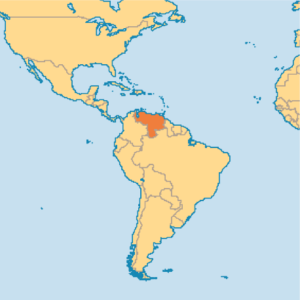 Home to Angel Falls, the world’s tallest waterfall, Venezuela is as beautiful as it is diverse. From the snow-capped peaks of the Andes in the West to the open plains in the East, from the beaches in the north to the jungles in the South, Venezuela is a truly magnificent nation. And its people are as diverse as its landscape. Eighty percent of this nation’s 30 million people live in the northern coastal regions; this includes both European and African people groups. In the interior, indigenous Amerindian tribes live in remote sections of the Amazon jungles and the southern highlands.
Home to Angel Falls, the world’s tallest waterfall, Venezuela is as beautiful as it is diverse. From the snow-capped peaks of the Andes in the West to the open plains in the East, from the beaches in the north to the jungles in the South, Venezuela is a truly magnificent nation. And its people are as diverse as its landscape. Eighty percent of this nation’s 30 million people live in the northern coastal regions; this includes both European and African people groups. In the interior, indigenous Amerindian tribes live in remote sections of the Amazon jungles and the southern highlands.
In contrast to its natural beauty, Venezuela’s history has been marred by economic turmoil, political strife, and violence. Despite having some of the world’s largest oil reserves, many people suffer in poverty. Over half of the urban population – over a million people – live in slums often controlled by gangs or drug barons. As a result of falling oil prices and restrictive policies, Venezuela has faced severe economic crises, leading to widespread critical shortages of food and medicine. Political corruption, divisions, revolutions, and coup attempts have often plagued this fragile democracy.
Yet in the midst of significant internal strife, this nation enjoys and celebrates freedom of worship. Though the majority of Venezuelans would identify as Christian (85%), many of these Catholics and Protestants don’t attend mass or church and even mix Christianity with false teachings and unbiblical practices like Spiritism. Venezuelan Christians need to be strengthened in unity and in the Truth of God’s Word as they face pressures from the growing New Age Spirituality movement, as well as the harmful effects of Satanism. Though Evangelical churches may be small in numbers, mission training centers are growing as Christians pursue a greater vision for missions. Many believers are even gaining influence in social and political spheres. Missionaries to Venezuela face many hurdles in serving and ministering, particularly to Amerindians, as expatriate service is restrained by the government. Yet even in the midst of these challenges, the Venezuelan Church is bringing the peace of Jesus Christ to a nation in much turmoil.
PRAYER: Heavenly Father, we take comfort knowing that You know those who take refuge in You. You know those who cleave to the Promise, trusting in the perfect provision of Jesus Christ and His perfect work of redemption. He finished the redemptive work for us, and now He is finishing His sanctifying work in us. We praise You for Your faithfulness and echo the refrain that ‘Your lovingkindness (hesed) is everlasting’. It is unfailing! How great is Your goodness! May our lives bring You glory and praise this day. In Jesus’ Name. Amen.
Pastor David
